






How Hospitals Are Closing the Staffing Gap
Baptist Health Expands
Home Health Care













Business Lexington is a production of Smiley Pete Publishing
PUBLISHER
Chris Eddie chris@bizlex.com
ASSOCIATE PUBLISHER Donna Hodsdon donna@bizlex.com
EDITOR
Tom Wilmes tomw@bizlex.com
ART DIRECTOR Drew Purcell drew@bizlex.com
COPY EDITOR
Nikole Christensen mail@nikolechristensen.com
BIZLIST EDITOR Tanzi Merritt bizlists@bizlex.com
SALES MANAGER Emily Marks emily@smileypete.com
ACCOUNT EXECUTIVE
Amy Eddie amy@bizlex.com
ACCOUNT EXECUTIVE Ann Staton ann@bizlex.com
SMILEY PETE PUBLISHING www.smileypete.com
For advertising information contact (859) 266-6537 advertise@smileypete.com info@smileypete.com
Inclusive language at work: Small impact,
Millstone chef-owner Tyler Murray
Mileta introduces lunch service
John’s Run/Walk Shop opens new location
Greek restaurateur Illias Pappas
Singletary Center for the Arts director Matt Gibson
Local

Frost Brown Todd LLP and Gibbons P.C. announced plans to combine to form FBT Gibbons LLP, a midmarket law firm that will employ about 800 attorneys across 25 offices nationwide. The merger is expected to take effect Jan. 1, 2026, pending partner votes at both firms.
Leadership at the combined firm will include Robert Sartin, chairman of Frost Brown Todd, as incoming chairman, with Peter Torcicollo of Gibbons and Frost Brown Todd CEO Adam Hall serving as co-managing partners. The firms said the union will give clients “a bestin-class national platform with deeper resources,” positioning the new firm to compete for middle-market and enterprise work across a broader geographic footprint.



FBT’s Lexington office opened in 1982 and now houses more than 40 attorneys — and officials said the merger aims to marry complementary practices and scale investments in talent and technology.

The University of Kentucky’s James B. Beam Institute for Kentucky Spirits completed an initial phase of a demonstration project testing hydrogen blended with natural gas to fuel distillation boilers.
Launched in November 2024 and funded by the Kentucky Energy and Environment Cabinet, the “Kentucky Distilled Spirits Industrial Decarbonization and Sustainability” project was led by JBBI Director Seth DeBolt in collaboration with UK’s Center for Applied Energy Research.
Over three months researchers produced 20 barrels — 10 using the hydrogen-natural gas blend and 10 using only natural gas — which now are aging in the Independent Stave Company Boswell Family Barrel Warehouse and will be evaluated after roughly four years of maturation.
Early data suggest co-firing hydrogen did not harm spirit quality, though full flavor analysis will be conducted after aging. CAER director Rodney Andrews called the initial results “promising,” and state energy officials said the work could help position Kentucky as a leader in industrial decarbonization for the spirits sector.
p Researchers at the University of Kentucky’s James B. Beam Institute for Kentucky Spirits are testing the efficacy of hydrogenblended fuel in bourbon distillation to advance sustainability in the industry.
Keeneland’s 2025 September Yearling Sale closed Sept. 20 with a worldwide record of $531.5 million in total receipts, selling 3,070 yearlings and surpassing last year’s take of about $428 million by more than 24 percent.
The 12-session auction produced 56 seven-figure yearlings and a record average price of $175,807 and median of $80,000. Leading the sale was a $3.3 million Gun Runner colt purchased jointly by M.V. Magnier, Peter Brant’s White Birch Farm and Ron Winchell’s Winchell Thoroughbreds.
Buyers represented 33 countries; Repole Stable led purchases with 33 horses for $14.2 million. Taylor Made Sales Agency was the top consignor, selling 333 yearlings for a consignor-record $68.5 million. Keeneland President and CEO Shannon Arvin called the results “incredible,” saying the sale’s strength exceeded expectations and underscored robust international demand and optimism for racing and breeding. Industry leaders said the record haul will benefit purses and investment across the sport.


Statistics on local residential and commercial property are compiled by the office of the Fayette County Property Valuation Administrator. The data reflect the most up-to-date information available at the time of printing for this publication, but monthly figures may be revised as additional public records of property transactions are submitted and become available.
9/30/25 2907 Richmond Road
9/12/25 881 Corporate Drive
9/25/25 272 W. New Circle Road
9/24/25 851 Corporate Drive
9/9/25 2073 Mercer Road
9/10/25 2101 Fontaine Road
$2,865,000* Hospitality/Recreation Brannon 230 LLC
$2,222,000 Medical Office Qureshi Properties 881 LLC
$1,900,000 Warehouse VBF Investments LLC
$1,692,900 Office Building Faithful Platform Properties LLC
$1,100,000 Warehouse Arnault Mercer LLC
$957,500 Multifamily Sho House Holdings LLC
9/12/25 255 Big Run Road $870,000 Office/Warehouse Synergy V LLC
9/12/25 180 Prosperous Pl. Unit D3
9/12/25 180 Prosperous Pl. Unit D2
9/12/25 180 Prosperous Pl. Unit D1
9/22/25 235 Stone Ave.
9/24/25 131-133 N. Limestone
9/2/25 3534 Tates Creek Road
9/26/25 1408 Leestown Road
9/9/25 1417 Edgelawn Ave.
$847,500* Office Condo Foundational Dental Properties LLC
$847,500* Office Condo Foundational Dental Properties LLC
$847,500* Office Condo Foundational Dental Properties LLC
$725,000 Multifamily Theta Of Kappa Alpha Housing Corp.
$685,000 Retail Ehnis LLC
$398,100 Religious Lexington Korean Presbyterian Church Inc.
$290,000 Auto Service Garage Synergy V LLC
$210,000 Multifamily The Riesig Group LLC
*Sale Price Based on a Multiple-Parcel Transaction ** Parcel includes multiple improvements, see property record for details
The chart below shows the monthly residential sales activity in Fayette County for the previous 24 months. The data for the most recent month reflects a projected estimate from the office of the Fayette County Property Valuation Administrator and is subject to change.

BY KENNADI JACOBS
nclusive language ensures that everyone feels valued and respected by recognizing diversity, expressing respect for colleagues and promoting equitable opportunities. It’s crucial to be mindful of this when communicating in professional or inclusive settings.
Respect for every person — regardless of their origins, identities or traits — is at the core of inclusive language. This connects to a key principle: cultural sensitivity.
Cultural sensitivity refers to the ability to acknowledge and respect the diversity of ideas, values, customs and behaviors within different cultural groups. It means recognizing that one’s own culture is not superior to others and being open to different perspectives without judgment. In practice, it involves being mindful of cultural differences and avoiding words that may offend or exclude specific communities. These principles guide the following guidelines for inclusive business communication.
Use person-first language. Focus on the individual, not their characteristics. For example, say “a person with a disability,” “a person who uses a wheelchair,” “a child with autism,” or “a person with a mental health condition,” instead of saying “the disabled,” “a wheelchair-bound person,” “an autistic child,” or “a mentally ill person.”
Use the singular “they.” When referring to someone whose gender is unknown or unspecified, use “they” instead of “he” or “she.”
Use clear and accessible language. Avoid jargon or overly technical phrases that might alienate or confuse audiences. Avoid broad generalizations. Steer clear of assumptions or stereotypes about people, places, groups or nations.
Don’t use “guys” to address a group. This is something I do a lot, especially unconsciously. Try “everyone,” “team,” or “you all” instead.
Be on the lookout for exclusionary language. Consider how your words might affect others and avoid phrasing that could make people feel unseen or undervalued.
Using inclusive language in business communication fosters a more respectful, collaborative and welcoming environment for all employees and clients. It leads to clearer communication, stronger relationships, and a more positive workplace environment. n
Kennadi Jacobs completed a practicum at the Carnegie Center for Literacy and Learning as part of her community and leadership development degree at the University of Kentucky. The Carnegie Center is a nonprofit educational organization that offers seasonal writing, publishing and language classes, along with other community programs. For more information, visit CarnegieCenterLex.org.

Millstone chef-owner Tyler
Murray blends elevated regional dishes with approachable dining in a renovated space
BY SHANNON CLINTON
Tyler Murray has drawn on years of past experience in his various roles as a chef — including feeding sports spectators, students, athletes, and hotel patrons in several states — to craft a Kentucky-forward menu with hints of Appalachian and Lowcountry cuisine for his new restaurant, Millstone.
The restaurant is set to open in early November at Dudley Square at 380 S. Mill St. in a space that formerly housed Dudley’s and Sabio restaurants. The building itself was built in 1881.
For Millstone, the space has been renovated and refreshed to accommodate four dining areas: an existing dining room for larger groups; a bar; a newly added dining room built on the former patio footprint; and, above that addition, a spacious seasonal deck shaded by trees.
Together, those areas will seat about 140 to 150 guests, Murray said.
Murray laughs when he says that “never in my culinary chef mind” did he think he’d one day be pondering lampshades and other design details.
But Murray said he’s giving every facet of the new restaurant his attention, aiming for a place that feels worthy of a nice date night yet comfortable, casual and affordable enough for a weekday dinner when cooking isn’t in the cards.
“In building out the concept of Millstone, we’re not trying to be the fanciest restaurant in Lexington,” he said.
“There are some great fancy restaurants in Lexington, don’t get me wrong, but the idea is having a place to connect and engage in a comfortable environment. [That] is the vibe that we want to give people when they first set foot in the space.”
Murray will serve as executive chef and owner. Randy Boden, most recently with the Holly Hill Restaurant Group, will be chef de cuisine.
They will prepare regionally influenced dishes that are familiar and approachable yet elevated, such as a take on chicken and dumplings that pairs seared, roasted chicken thighs with pillowy Parmesan-ricotta gnocchi and wild mushrooms.
Murray’s road to Millstone is a full circle of sorts. The Maysville, Kentucky, native started his restaurant career in Lexington at age 19 at the Marriott Lexington Griffin Gate while attending the University of Kentucky.
He then enrolled at the Midwest Culinary Institute in Cincinnati and worked at the Cincinnati Marriott for four years, advancing from buffet replenisher to sous chef.
Next came the Charleston Renaissance Hotel, where he served as executive chef and embraced Lowcountry cuisine while learning from seasoned colleagues how to make proper Southern grits. “I loved my time in Charleston,” he said.
With a wife and a baby on the way, he then moved to another closer Charleston — this time in West Virginia — to oversee food-and-beverage operations for a large hotel. He later worked in Ohio and Washington, D.C., before returning to Lexington five years ago to oversee UK Dining.
“The beast of it was obviously student dining — you’re talking 9,000 people a day through both of the dining halls,” he said.
A big University of Kentucky sports fan, Murray enjoyed working with athletes across many sports as he helped manage food service during home games, including VIP suites at Kroger Field. He also catered luncheons at the college president’s house and other special events.
Still, he said he missed the creativity of owning his own restaurant: curating a seasonal menu, seeing a dish through from concept to plate, and watching diners enjoy it.
With Millstone, a career’s worth of culinary experience and expressiveness has come to fruition, and he invites the community to take a seat at his table.
“[It’s] kind of the core of the culinary art of being creative and developing something from scratch, and telling a story about what that food is,” Murray said. n


BY SHANNON CLINTON
Mileta Chef Alex Green finds inspiration everywhere — from vibrant farmers market produce and Kentucky-sourced sturgeon caviar to wild edibles he’s foraged with friends.
With the addition of lunch service at the Fayette Mall restaurant, Green said he wanted to introduce a more casual, quick, and affordable dining option while still showcasing highquality, locally driven ingredients.
Menus are updated once or twice a week to reflect what Green calls the “hyperseasonality” of ingredients. “If it’s made and grown in Kentucky, we’re willing to spend extra dollars if we need to, to support those farmers,” he said.
Lunch can be a leisurely meal that lingers for hours or, for those short on time, served quickly. “Everything is made to order, but you can order a burger and it will be, depending on how busy we are, on your table in 10 minutes,” Green said.
One standout is the “comically big” crispy Weisenberger cornmeal-breaded catfish sandwich, featuring wild-caught fish from Kentucky Lake and Lake Barkley and topped with herb-studded mayo and lemon hot sauce.
Leave room for dessert: recent offerings have included parmesan soft-serve ice cream (“trust us, it works!”) with balsamic caramel, olive oil, and meringue sprinkles.
In other local restaurant news:
Taste of Ukraine, owned by Tetiana Soloschuk, said to be Kentucky’s first Ukrainian restaurant, is coming to downtown Nicholasville. Menu items include borscht, dumplings, potato pancakes, and kebabs.
Chocolate Holler has relocated to Greyline Station at 101 W. Loudon Ave.

p
Mileta chef Alex Green and owner
Dallas Rose recently introduced a new lunch service featuring seasonal ingredients and a more casual, quicker pace.
Playa Bowls 2 opened at the French Quarter, 2573 Richmond Road.
The V at The Vine, the fine-dining restaurant at The Vine Lexington, 106 W Vine Street, opened in September with a seafood-forward menu, steaks, and wine pairings.
Bert’s Speakcheezy is now open at 2985 Liberty Road.
Mama Linda’s Chicken has opened at 580 Eureka Springs, serving chicken, ribeye, burgers, fish, salads, desserts, and sides.
The Boxcar at Gatton Park has opened in the plaza area of the park in a restored railcar, serving grab-and-go light bites, flatbreads, and nonalcoholic beverages.
“If it’s made and grown in Kentucky, we’re willing to spend extra dollars if we need to, to support those farmers.”
ALEX GREEN MILETA EXECUTIVE CHEF
Southern Cookhouse & Bar opened in September at 844 Hays Blvd. The menu features Southern comfort foods, with “Kentucky Proud” burgers, sandwiches and entrées such as bourbon-glazed filet tips.
Fond farewells: The Wok on Waller Avenue has closed and is set to become China Hut; West Coast Pizza on Nicholasville Road has served its last slice; Maple Street Biscuit Co. closed at 2270 Nicholasville Rd.; the Lawrenceburg location of Serafini shuttered after only a few months; Biscuit Belly on Lucille Drive has also closed; and Vinaigrette Salad Kitchen on Broadway at The Square has closed permanently (with remaining locations in Palomar, Hamburg and on Bardstown Road in Louisville remaining open). And finally: Tuk Tuk Snack Shop will close as of mid-November, a Facebook post from chef Sam Fore announced. n

BY LIZ CAREY
ohn’s Run/Walk Shop will fulfill a goal several years in the making with the opening of its latest store in Hamburg, general manager Riley Marshall said. The new store, opening later this month at 3090 Helmsdale Place, will join the shop’s retail locations in Chevy Chase and Palomar.
“We’ve been looking to go into Hamburg and that area of town for a while now,” Marshall said. “One of the things that a lot of people don’t realize about John’s is that people travel into Lexington from an hour, two hours, or three hours away, so having a location closer to I-75 gives us a better opportunity to help those people in a way where they don’t have to drive all the way into downtown.”
The growing residential base in Hamburg was also a draw, just as it was when the shop opened its second location in Palomar.
“We are thrilled to bring John’s Run/Walk Shop to the vibrant Hamburg community,” owner Melody Marshall said. “This expansion allows us to better serve our growing customer base and continue our mission of promoting health and wellness in our community.”
John’s Run/Walk Shop began 47 years ago when the store’s original owner, John Sensenig, noticed at a local 10K that many runners were not wearing proper running shoes. The closest place to buy running shoes at the time was in Cincinnati.
Sensenig aimed to build a place where people could be properly fitted and feel confident in their equipment. That flagship store in Chevy Chase was joined by a store in Palomar in 2015. Sensenig retired that
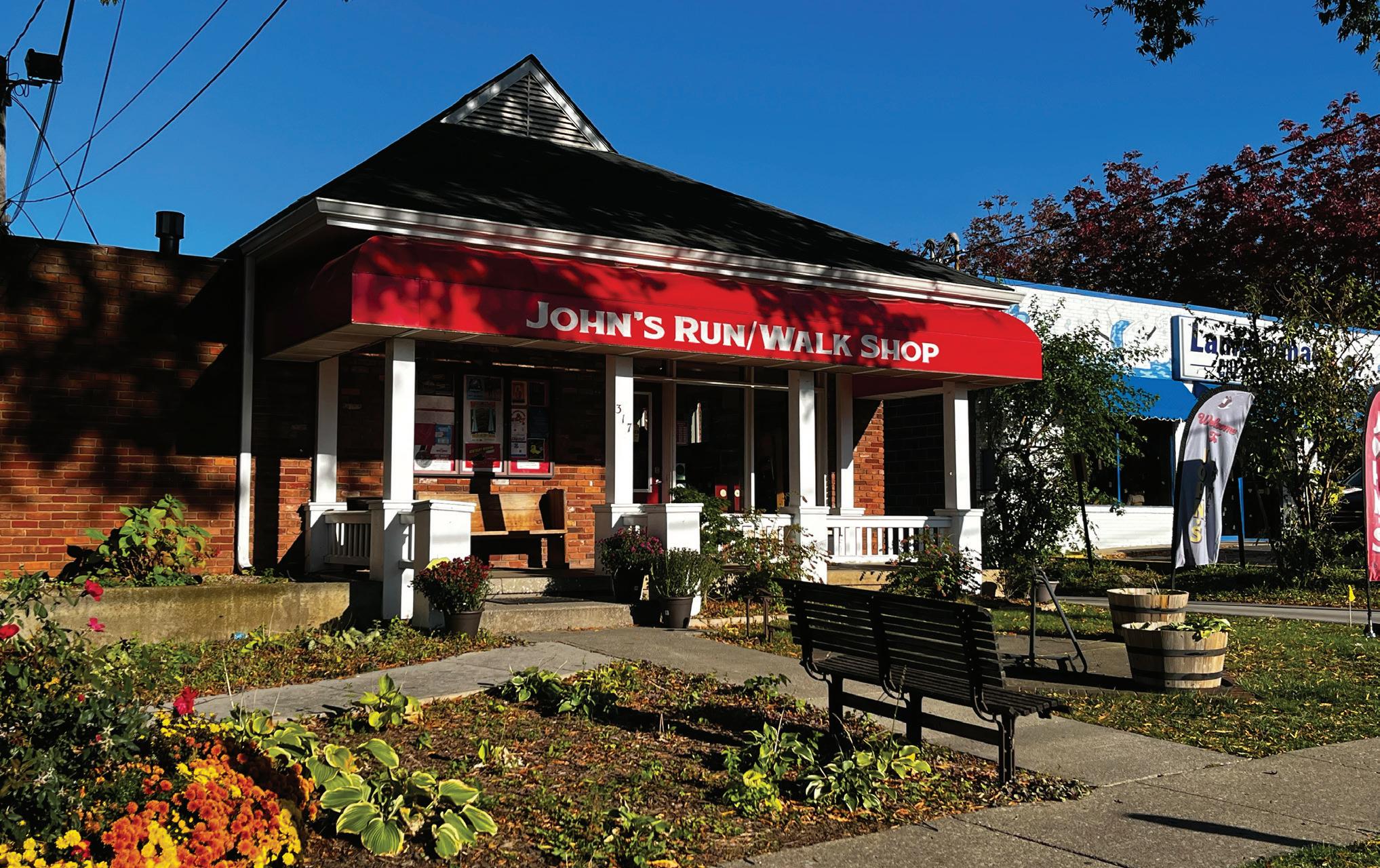
t John’s Run/Walk Shop’s original location in Chevy Chase. The business, which also has a Palomar location, is opening a third store in the Hamburg area.
same year, and sold the business to Melody Marshall, the store’s longtime accountant and a runner since age 12. Riley Marshall is her son.
John’s New Classic Shoes, a companion store that stocked more “lifestyle” shoes, opened across the street in 2002. When the pandemic hit, its inventory was absorbed into the other two locations.
“There was a massive running boom during COVID because the gyms shut down,” Riley Marshall said. “We’re still seeing that increase even five and a half years out.”
Now all three stores carry a range of shoes from running and walking, to dressier shoes, boots, sandals, and slippers.
Marshall said the business takes a customer’s measurements and does gait and wear-pattern analysis to make sure it addresses a customer’s footwear needs.
“Life is too important to be worried about your shoes,” Riley Marshall said. “But I hope that when people do need new shoes, we’re the first place they think of.”
John’s Run/Walk Shop also hosts multiple weekly group runs and walks from its Chevy Chase and Palomar Centre locations. Beginning this summer, the shop added Saturday morning run/walks in the Hamburg area, with the second Saturday of each month featuring a free community 5K. The Hamburg runs and monthly 5K are expected to continue alongside the regular events at the other two locations.
“Accessibility to a healthy lifestyle is one of our core goals,” Riley Marshall said.
Another goal the business recently achieved is a closed-loop system for shoes and apparel. In July the business announced that more than 75 percent of the products it sells are part of a system that allows customers to return items at the end of their lifecycle to be reused, refurbished, or responsibly recycled.
The shoes are inspected to see if they can be reused, with gently worn pairs being distributed through local partner organizations such as Lighthouse Ministries. What can’t be given away locally is shipped to Sneaker Impact, which refurbishes shoes for resale in developing countries. Completely spent shoes are ground into recycled materials, which are used to manufacture new products.

p John’s Run/ Walk Shop hosts multiple weekly group runs and walks from all of its locations.
“Accessibility to a healthy lifestyle is one of our core goals,” said General Manager Riley Marshall.
Marshall said achieving many of this year’s goals — and having to set new ones — is a good problem to have. That success, he noted, comes from quarterly meetings to set objectives and make adjustments as needed.
“We’re very good at pivoting as a business,” he said. “We sat down at the beginning of 2020 and wrote out our goals. One of them was to be more in person with our customers. Then COVID happened. We sat down again this year and updated our goals. When we found out this location was available, our goals changed again.”
Marketing Director Matt Reno puts it another way: “When you’ve been in business for 47 years, you’ll see a lot of new opportunities, economic ups and downs, and shifts in retail trends. You have to be able to adapt while staying true to your core focus of customer service and serving the community.” n
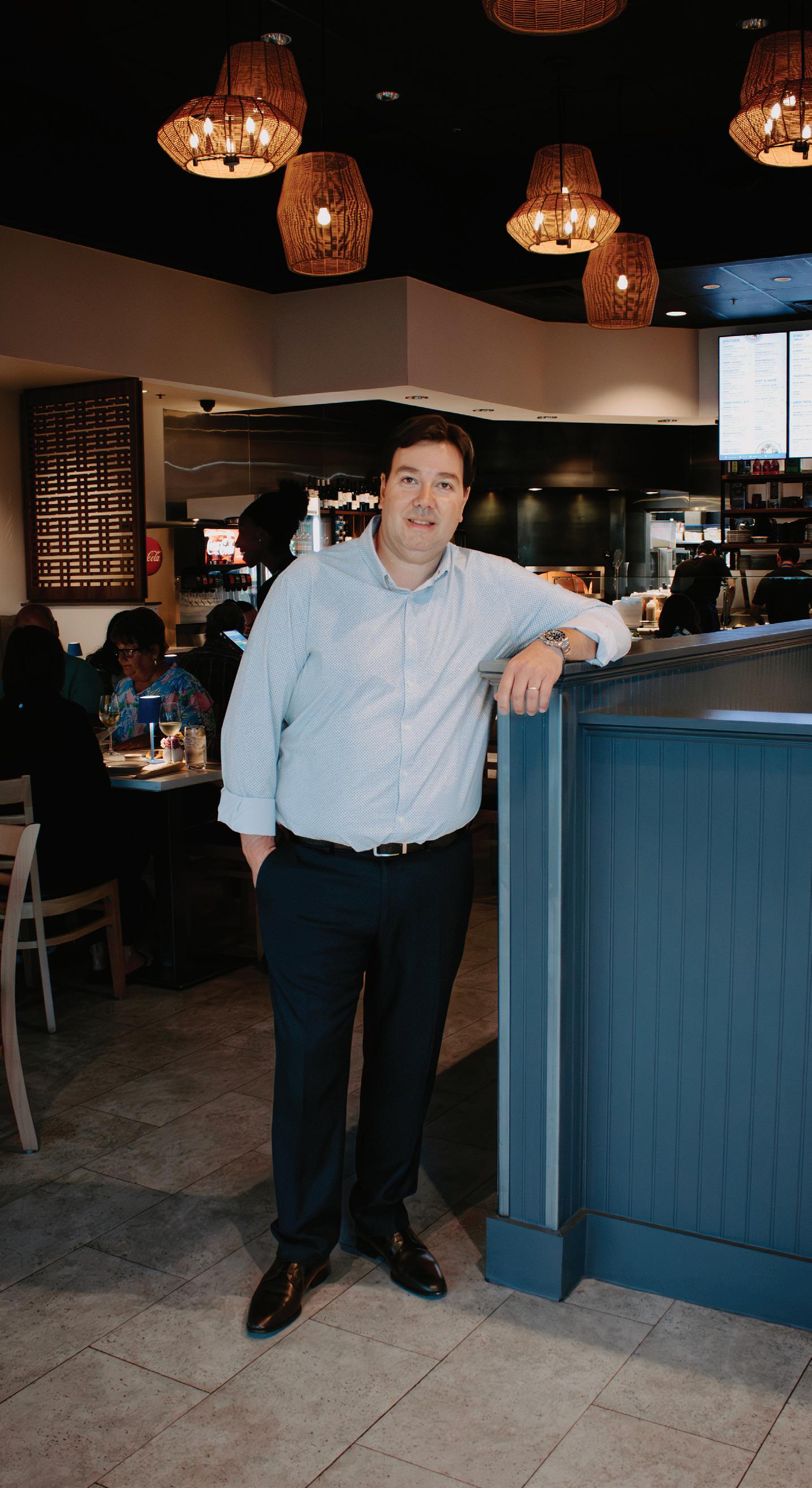
From food truck to franchise, a look at how Greek restaurateur Ilias Pappas has grown his brand over the past decade and a half
BY SHANNON CLINTON
The American notion of teenagers having summer jobs was a foreign concept for Lexington restaurateur Ilias Pappas. Pappas, owner of Athenian Grill, grew up in Lamia, Greece, noting that Greeks typically first enter the workforce around age 25.
Not only was the entrepreneur not wanting to wait that long to begin his career, he was willing to move to another country to do it.
Pappas, who describes himself as having been an active teenager, said while he wanted to play soccer and be involved with other sports, his primary interest was to follow the lead of his parents, who worked hard to support him and his brother.
“I wanted to work,” he said.
In 1998, Pappas followed in the footsteps of his aunt, Louiza Ouraniou, and moved to Lexington. He started working in her restaurant and others while studying hospitality administration/management at the University of Kentucky.
On her visits back home to Greece, Ouraniou had witnessed her nephew’s potential, and she knew he’d also inherited his grandmother’s love for cooking and its ability to bring people together.
Ouraniou, who notes that Pappas still uses her own special lamb-chop marinade in his restaurants, is retired from the restaurant business now, but she stops in often to check on her nephew and enjoy meals from his growing family of restaurants.
“He is the hardest working person I’ve ever met,” she said. “He cherishes the time we spend together, and also with his wife and son.”
After a couple years at UK, Pappas transferred to Florida International University, where he studied management information systems and business.
“From the beginning, I had passion for the food, but I also had a passion for the business,” he said.
During a decade spent in Miami, Pappas honed his culinary skills and soaked up as much experience as he could outside the classroom about the intricacies of the restaurant business, from employers and other experts in the field.
In 2011, he returned to Lexington eager to open his own restaurant. His first step was to open a popup Greek food truck serving the local brewery circuit; the following year, he launched a Kickstarter campaign to help fund a brick-and-mortar. The first location of Athenian Grill restaurant, opened in 2013, at 313 S. Ashland Ave.
He pre-sold meals to buy the equipment to furnish the restaurant’s kitchen; from there, growth came swiftly and steadily, dish by dish.
One key to Pappas’ success is his ability to continuously reassess operations and make changes as needed. He opened a location at The Summit at Fritz Farm that later closed, and another at Locust Hill, which he later repurposed as a catering kitchen. In 2019, he opened an Athenian Grill location in the Park Plaza apartment complex on East Main Street.
This summer, he opened Athenian Grill’s newest location, on Mall Road near Fayette Mall. With a similar menu to the Chevy Chase and Park Plaza locations, the new restaurant offers more seating than those locations and allows customers the option of either ordering at a counter or table service.
Pappas said flexibility is baked into his business philosophy as much as using family recipes and only serving dishes that he personally enjoys eating (knowing that customers will, too). He’s built his menus from recipes that would be served in the homes of his family and friends in Greece, with appetizer items that include Greek sausage, traditional hummus, and spanikopita, and main courses ranging from gyros and falafel to grilled lamb chops, chicken Santorini, and Moussaka, a traditional Greek casserole with eggplant,

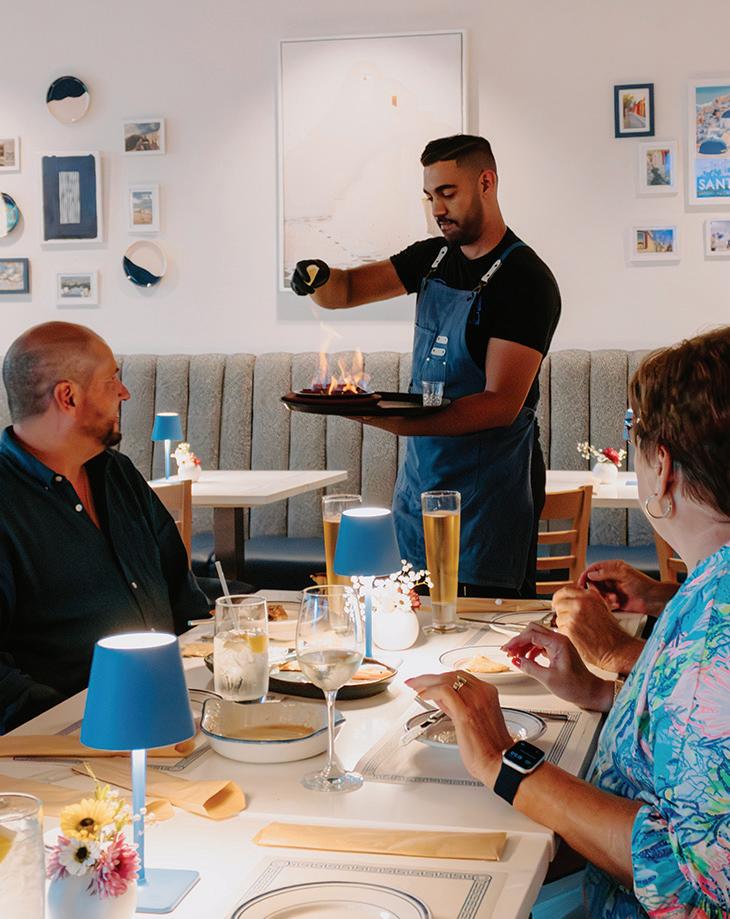
ground beef, tomato and béchamel sauce. Decadent homemade sweets, like baklava and a Greek orange cake called portokalopita round out the menu.
For the past few years, Pappas’s food dynasty has included University of Kentucky’s Training Table dining facility, which offers football team members meals designed to satisfy their unique nutritional needs for training and performance while also pleasing their palates.
Josh Pruitt, UK’s director of football operations, said the relationship between Pappas and his program began four or five years ago.
“We were just trying to come up with ideas and different things to provide our players that would be something they would enjoy and that changed on a daily basis,” he said.
With 115 to 150 hungry athletes to feed two to three times daily, each with distinct dietary needs, Aramark officials proposed that Athenian Grill run the facility’s kitchen as a restaurant of sorts, using its own employees who are held to high standards of prepping, plating and cooking healthy yet tasty options with locally-sourced ingredients and input from sports dieticians.
“Ilias has done a great job of being able to provide that for us for the past couple of years,” Pruitt said.
To make such a vast operation go smoothly, the Athenian Grill staff must work as a unit much like the sports team it serves, with the support of the university and Aramark.
“It’s an extremely large operation,” Pruitt said. “It’s kind of like a Vegas buffet that never stops.”
Pappas said the UK venture gave him confidence to pursue non-Greek concepts even beyond Kentucky’s borders.
Partnering with hospitality firms like Aramark and Levy Restaurants, his staff now provides food at universities in South Carolina, Tennessee and Ohio. For example, at Miami University in Ohio, he operates a Southwestern food ghost kitchen.
A goal for 2026 is for Athenian Grill to enter the Louisville area, followed by expansion into Cincinnati and Indianapolis.
Pappas is even taking a bite out of the Big Apple, with Levy having selected him to open an Athenian Grill at the market at Javits Center in New York. A fast-casual Greek concept called Yeero Greek Eatery is also set to debut in New York in midNovember.
“We’re pretty proud that a company that started in Lexington, supported by Lexington, has been chosen to be at the Mecca of food,” Pappas said.
With so many local, expanding and far-flung projects, another piece of the spanikopita (Greek pie) for Pappas is to have a chef-driven management style for each restaurant.
And among his roughly 200 employees, Pappas has curated a group of trusted, adept professionals to whom he confidently delegates day-to-day tasks, such as HR, finance, culinary support and more.
“We continue developing the team daily and recruiting,” he said. “I have a team around me focused on the different departments.”
That leaves him time to seek potential expansion properties and new opportunities, meet with clients, and travel.

He visits his various properties as often as possible to check in, especially the local ones.
He also treasures and prioritizes time with family including his son, George, 5, and travels back to Greece for a few weeks in early summer, when things tend to slow down a little. There, he finds new flavors and inspirations to add to his menus.
Pappas was hesitant to discuss other ventures like real estate, saying they might distract from his primary focus — his culinary career. But just as an entree is enhanced by its side dishes, this restaurateur has made forays into the real estate sector as a co-owner in the Greek luxury home co-ownership firm Owners.gr.
Even with all his successes to date, Pappas, 45, said he faces any challenges by simply focusing on food, its flavor and execution, doing a good job and building something positive, prioritizing results and trying not to take on more than he can handle.
“I call myself a doer. I get things done,” he said. “That’s my focus.
We only took on projects that we knew we could do an extremely good job at.”
Pappas expressed deep appreciation for the Lexington community, which he said has been “an incredible support to me and the family.
“No matter what, I’m always going to be extremely thankful for that,” he said. n

WHERE WOULD YOU GO IN AN EMERGENCY? The ER at Baptist Health Hamburg is built for you. Built to make your drive time shorter when every second counts. Built to give you and your neighbors a trusted place to go when something is wrong. Our emergency room is staffed with trained medical professionals who are ready to assist patients of any age with a range of conditions. In an emergency, we’re here 24/7 with patient-centered care, built for Hamburg. Learn more at BaptistHealth.com/BuiltForHamburg.
Corbin | Floyd | Hardin | La Grange | Lexington | Louisville | Madisonville | Paducah | Richmond
EMERGENC Y C ARE A department of Baptist Health Lexington
BaptistHealth.com




The Singletary Center for the Arts’ director on expanding the stage, balancing the books, and supporting Lexington’s vibrant arts scene
BY MATT WICKSTROM

atthew Gibson has worked in various roles at the Singletary Center for the Arts, part of the University of Kentucky’s College of Fine Arts, since he joined the staff in 2014 as marketing and ticketing director. He served as director of operations during the 2020-21 season, was interim director the following year and became director in 2022.
Gibson graduated from the University of Kentucky in 2003 with an economics degree. He worked as a financial adviser for a few years before a conversation with the Lexington Philharmonic’s marketing director — at the Singletary Center, of all places — helped inspire his foray into arts administration. A career in finance “wasn’t something I saw myself doing for the long haul,” Gibson said.
He re-enrolled at UK to study arts administration, earning his bachelor’s degree in 2012 and a master’s in 2019. During that time, he worked at WRFL, the university’s student-run radio station, serving as a DJ, program director, and general manager. He also helped organize the multi-day Boomslang festival from 2010 to 2012 — an experience that sparked his interest in event production.
“When I was doing Boomslang I had no idea it would be the thing that galvanized my career direction,” Gibson said. “Looking back, I’m proud of what we accomplished and how it helped shape my trajectory.”
Just as the Singletary Center’s 2025-26 season is ramping up, BizLex spoke with Gibson to talk about his approach to running the venue, the biggest challenges he’s faced, profitability and more.
Is your approach to running the Singletary Center different from those who held the director position before you?
As marketing and ticketing director, I sold former director Michael Grice’s shows here for six years. He’d often do a handful of large-scale shows — our whole season was maybe five or six events from September to May — and almost all of them were very ambitious.
This year we have 14 events in the season, and we’re using the smaller recital hall far more than in the past. We want to reach more niche audiences and bring in things that are a little less familiar to the Lexington community. I also curate a lot of jazz, avant garde, and experimental music under the umbrella of our Expansive Sound Series, which pushes against the boundaries of what the Center has done in the past and what people can find here in town as a whole.
What else made you want to expand the Singletary Center’s programming?

Although I’ve scaled back some of the larger-scale shows, we still present concert-hall programming and bigger events. The talent we can book at lower price points is remarkable, and the financial risk is less. That lets us take more chances and present a greater diversity of programming by booking artists who are under the mainstream radar or still emerging, creating distinctive, special experiences.
For all of its programming, is the Singletary Center profitable?
Since we’re considered an auxiliary unit to the College of Fine Arts, we are financially freestanding, meaning that we have to earn all the money that pays for our programming season along with paying our employees. We have about 60 student employees who are all paid from our revenues, too. We receive a small amount of funding from the college, but by and large we must earn our own way.
What are some challenges in running the Singletary Center?
Operating within the university definitely has its pros and cons. There’s a certain amount of stability — all of my employees receive good benefit packages through UK — but it’s also hard to stay competitive in terms of compensation rates. I don’t get to determine what a job offer will look like; those decisions are centralized.
When it comes to attracting the most talented, professional people, you have to emphasize workplace culture. I hate asking people to accept financial concessions to work in the arts because much of our value is intangible. When you try to translate that value into dollars, there can be a disconnect between monetary compensation and the emotional, experiential value presented through art. It’s something all employers face to some extent, but it’s more complicated in the arts.
Much of the center’s success is due to the tireless efforts of my staff. They’re a phenomenal group of arts professionals who have great skills and amazing dedication to their work. I come up with some unpredictable ideas for our programming season, and they consistently rise to the occasion.
What are your thoughts on the Singletary Center’s role in Lexington and Kentucky’s creative landscape?
We fill a unique role in Lexington’s arts ecosystem. Many local arts organizations want to host performances here or have been doing so for years. That’s been good for us financially, but it has equal intrinsic value in networking and in building our creative community. My hope is to keep it going. I want the center to be as vital and vibrant as possible, and it feels like we’re on a strong trajectory. n
What’s the best concert you’ve ever attended?
It was seeing SUNN O))) and Boris at the Wexner Center in Columbus [Ohio] in 2006. They were touring together on their collaborative album Altar, and it was the loudest show I’ve seen in my entire life. It shook everything and would make the cartilage in your nose tickle.
What’s your bucket list event you’d like to bring to the Singletary Center?
I actually have a couple of them booked for this season. Yo La Tengo was just here [on Oct. 24] and in November Tortoise is coming through.
What’s your go-to food spot in Lexington?
I really like Han Woo Ri. It’s a Korean restaurant right next to where CD Central — now Cut Corner Records — and SQecial Media are. The dolsat bibimbap (assorted vegetables, ground beef, and an egg over rice in a hot stone bowl) is my favorite. I also like their dumplings.
If you weren’t working at the Singletary Center, what would you be doing?
I worked at CD Central for seven years after my career as a financial advisor ended and before I started at the Singletary Center. I always had a dream of owning the place but knew while I was there that Steve [Baron’s] retirement was still a ways off, so if I never got the gig at the Singletary Center I probably would’ve been trying to buy CD Central off him or started my own record store instead.

BY LIZ CAREY
Hiring in the health care workforce continues to face mounting challenges.
According to a report from the American Hospital Association, the health care industry could face a shortage of about 100,000 workers by 2028. A study by Mercer and Lightcast projects that shortages will vary by region, with populous states such as New York and New Jersey experiencing the most acute gaps, while states like California, Texas and Pennsylvania could see a labor supply that exceeds demand.
In Kentucky, the study forecasts a shortage of 4,550 health care workers — a 2% gap for the state’s 4.5 million residents. By comparison, Indiana faces a shortage of about 2,220 workers (0.67%), while Ohio is expected to have a surplus of roughly 4,335 workers. Tennessee faces the steepest regional deficit, needing an additional 16,719 workers, or nearly 5% of its health care workforce.
By category, Kentucky’s shortages include nearly 2,000 registered nurses (RNs), 1,503 nursing assistants, 991 home health care aides, 158 nurse practitioners, and 358 physicians.
The Kentucky Hospital Association (KHA) reports those shortages are already being felt. An October KHA report found 2,821 RN vacancies statewide, with one in five medical-surgical RN positions unfilled — a 17% vacancy rate. The report also noted that by 2030, one in four psychiatric nurses and nearly one in five operating room nurses are expected to retire.
Even with more than 5,000 students currently enrolled in RN programs, graduation rates still fall short of meeting demand.
Health care employers across Central Kentucky are rethinking how they attract and retain staff.
“We’re seeing the same challenges and problems that our peers are seeing across the country,” said Fredrick Martin, associate vice president of human resources at UK HealthCare. “By 2030 there is projected to be a shortage of around 64,000 skilled nursing care individuals across the country. When you think about that alone, it’s a staggering number. And it’s also a moving target. It could be plus or minus 10,000, 20,000 or 30,000 people.”
At Saint Joseph Health, Chief Nursing Executive Melissa Bennett said the system’s top need is for registered nurses.
“At Saint Joseph Health, as with many health systems across the country, our No. 1 priority is registered nurses, specifically bedside nurses, at all departments — critical care, med-surg/telemetry and care management,” Bennett said. “We also have needs for imaging professionals in all modalities — MRI, CT, ultrasound, nuclear medicine and radiology. In particular, there is a great need for interventional radiology technicians to work in the cath lab.”
Experts say addressing worker shortages, especially in skilled nursing, requires building a stronger workforce pipeline from high schools to community colleges and universities to ensure a steady flow of new healthcare professionals.
“It’s great that colleges and universities have added spots in their nursing programs, and we are working with several of them to increase the pipeline for students interested in health care,” Bennett said. “We are partnering with several nursing schools to provide scholarships to students who make a commitment to work with Saint Joseph after graduation. We have a similar program for imaging professionals.”
Other programs at Saint Joseph include externships that offer students hands-on experience, and a New Grad Residency Program that helps recent nursing graduates transition into professional roles.
Martin said UK HealthCare is also focusing on retaining graduates from the UK College of Nursing.
“In years past that may have not always been the case,”
he said. “The premise in the past may have been that those students are already here, and they’re automatically going to stay here regardless. But times have changed, and this is a very different generation of workers coming into the health care space and employment as a whole. We have to change tactics and be very intentional about going after that population of individuals.”
He added that UK HealthCare is also reaching out to workers in nearby metro areas such as Louisville and Cincinnati to attract them to Central Kentucky.
Another focus, Martin said, is helping nurses see the longterm benefits of staff employment. During the pandemic, many nurses left hospital positions to become traveling nurses, earning as much as $150 an hour, according to TravelNursing.org. That rate has since declined to about $44 an hour, prompting hospitals to re-evaluate their staffing strategies.
“There will never be a place where you don’t have any travelers whatsoever because there is a place for them in any organization to help fill gaps and holes, like during the holidays when people need to have time off with family,” Martin said. “We have a couple of strategies that we’re employing to really convert those travelers… and to show them that they love it here, we love having them here, and there are multiple ways to get them here and have them stay here.”
While urban hospitals face stiff competition for talent, rural systems are also struggling.
“Workforce continues to be a top concern for rural hospitals, and is a priority focus area for the $50 billion Federal Rural Transformation Fund recently approved by Congress,” said Alan Morgan, CEO of the National Rural Health Association. “Both clinical and administrative staff are issues of concern for rural hospitals. The top national strategies for addressing rural workforce shortages include promoting and funding rural residency programs, establishing pipeline programs within rural communities themselves, and, of course, loan repayment and forgiveness efforts.”
Martin said the growing competition means health care systems must rethink how they engage potential employees.
“We are in a space and in an age where the candidate experience is just that much more important because they’re getting offers and attention from everywhere,” he said. “We have to ask ourselves; how do we create an experience that speaks to that candidate in a way that says, ‘This is the place for you to be. We want to have you here and connect you with our mission for serving Kentucky.’” n
“Both clinical and administrative staff are issues of concern for rural hospitals. The top national strategies for addressing rural workforce shortages include promoting and funding rural residency programs, establishing pipeline programs within rural communities themselves, and, of course, loan repayment and forgiveness efforts.”
ALAN MORGAN NATIONAL RURAL HEALTH ASSOCIATION CEO
Partnership with ASHN adds staff and expands in-home services, but rural access and workforce gaps remain a challenge
BY DAN DICKSON
Baptist Health’s expansion of its home health footprint in Kentucky, in partnership with Alternate Solutions Health Network (ASHN), signals a strategic push deeper into communityand home-based care. Under the arrangement, Baptist Health Home Care is extending services across Kentucky, southern Indiana and southern Illinois. ASHN already has joint-venture agreements with more than 90 home health and hospice providers across six states, giving it extensive experience in the field. Clinical infrastructure and scale make Baptist Health and ASHN logical partners.
The venture, owned by both Baptist Health and ASHN, will operate as Baptist Health Home Care. That branding allows Baptist Health to maintain its patient and provider identity even as ASHN supports the “behind-the-scenes” operations. Baptist Health will be able to deliver more care outside its facilities and into patients’ homes, neighborhoods and community settings. Another benefit of the plan is the potential to reduce hospital readmissions while deepening relationships with patients and referring physicians.
In a commentary in Becker’s Hospital Review, Rick Carrico, Baptist Health’s chief financial officer, described home health as a positive extension for the organization. The partnership aligns with Baptist Health’s broader goals of efficiency and high-quality care, leaning on advanced technologies to ensure timely responses and interventions through monitoring patients at home. “We feel like the extending of post-acute services is a natural lane for us to be in,” Carrico said. “We appreciate
“We feel like the extending of post-acute services is a natural lane for us to be in. We appreciate the fact that we found a partner to help us navigate some of the key opportunities there, as well as the challenges.”
RICK CARRICO BAPTIST HEALTH CFO
the fact that we found a partner to help us navigate some of the key opportunities there, as well as the challenges.”
ASHN, headquartered in Kettering, Ohio, sees the collaboration as building on a platform already laid by Baptist Health. “As we partner together, we are not just building a brighter future, we are building on a foundation of unwavering dedication to the health and well-being of these cherished communities,” said Everett Neal, president of ASHN.
Demand for home-based care is growing rapidly in Kentucky and nationwide. The trend is driven by demographic shifts, patient preference and reimbursement incentives. An aging population with chronic conditions and post-hospital care needs is well suited to home settings, and more patients say they prefer recovery or chronic care at home rather than in institutions.
Health systems are likewise shifting toward value-based care and risk models that can reduce costly hospital readmissions. Payers such as Medicare increasingly back models that support homebased and community-based services over hospital-centered models. Technology — including remote monitoring, telehealth, care-coordination platforms and predictive analytics — plays a central role in enabling these models.
Home Health Care News reported that the venture could involve up to 200 employees, some transferred from within Baptist Health’s system and others newly hired for the home care operations. “The collaboration supports opportunities in roles such as nurses, therapists, social workers, aides, and clinical managers as demand for home care grows with the population,” said Isaac Myers, chief health integration officer of Baptist Health.

That staffing list can also include home-health aides with support staff, care coordinators, case managers, and administrative and back-office employees for scheduling, billing, training and quality assurance. “Technology will also play an important role,” Myers added, “with at-home patient monitoring helping patients stay on the right path to recovery and enabling care teams to respond quickly when needs arise.”
An American Medical Association publication noted that Baptist Health’s home health caregivers have been delivering about 100,000 home care visits a year in recent years, including nursing, therapy, speech and social-work services — suggesting a mature home care base already exists.
Why did Baptist Health not simply grow its home health operations alone? The decision to partner with ASHN points to several strategic rationales. ASHN’s experience running home health and hospice programs and its institutional knowledge can smooth scaling. Growth in the home health field requires capital, compliance expertise, regulatory navigation and management of reimbursement risk. Partnering allows Baptist Health to share risk and investment while accelerating market entry.
Baptist Health’s home care service page on its website emphasizes that its in-home offerings are Medicare- and Medicaid-certified, Joint Commission-accredited and include the full slate of skilled services previously mentioned. That indicates the joint venture is not starting from scratch but is aimed at expansion and modernization.
Statewide, Kentucky’s home health and homebased care sector is growing in response to demand but still faces gaps in access, funding and workforce. Coverage is uneven and many rural areas are underserved. In 2023, Gov. Andy Beshear raised Medicaid reimbursement rates for homeand community-based services to help providers cope with inflation and staffing challenges, according to Kentucky Health News. The waiting list for Kentucky’s subsidized home-based care remains large, and matching supply with demand is more complex in rural areas; some rural health departments have exited home-health care altogether.
Nevertheless, Kentucky’s home health landscape is improving with program expansion and state support, but it remains far from meeting growing demand in rural and underserved counties, and quality varies across the Commonwealth. n
p Baptist Health’s home care services are Medicare- and Medicaid-certified, accredited by The Joint Commission, and offer a full range of skilled care services.
New menopause clinic with all-women physicians
Emergency Medicine physicians in 7 hospitals across Central & Eastern Kentucky
Center for Breast Care becomes 1 of just 2 practices in Kentucky to achieve the National Accreditation Program for Breast Centers (NAPBC) by the American College of Surgeons
Expanded Rheumatology Infusion Suite
Urology Department designated as a Center of Excellence for bladder incontinence and enlarged prostate surgical treatments
Since its founding, Lexington Clinic has continuously brought new medical options to the people of Central Kentucky, starting with hiring Lexington’s first pathologist mere months after its formation in 1920. That was only the start. Today, we continue our ceaseless dedication to improvement for our patients. The advancements on these pages are just from 2025.

Imagine what we’ll do next.
RANKED BY NUMBER OF LICENSED BEDS JAN. 1 – DEC. 31, 2024
UK HealthCare
Albert B. Chandler Hospital 800 Rose St. Lexington, KY 40536 (859) 323-5000 ukhealthcare.uky.edu/hospitals/ albert-b-chandler-hospital
Baptist Health Lexington 1740 Nicholasville Road Lexington, KY 40503 (859) 260-6100 baptisthealth.com/lexington
Saint Joseph Hospital
1 Saint Joseph Dr. Lexington, KY 40504 (859) 313-1000 chisaintjosephhealth.org/ saint-joseph-hospital
Saint Joseph East 150 N. Eagle Creek Dr. Lexington, KY 40509 (859) 967-5000 chisaintjosephhealth.org/ saint-joseph-east
UK HealthCare
Good Samaritan Hospital 310 S. Limestone St. Lexington, KY 40508 (859) 323-7000 ukhealthcare.uky.edu/ good-samaritan-hospital
Frankfort Regional Medical Center
299 Kings Daughters Dr. Frankfort, KY 40601 (502) 875-5240 frankfortregional.com
Ephriam McDowell Regional Medical Center 21 S. Third St. Danville, KY 40422 (859) 239-1000 emrmc.org
Baptist Health Richmond 801 Eastern Bypass Richmond, KY 40475 (859) 333-4415 baptisthealth.com/locations/ baptist-health-richmond
Top Local Official
Eric Monday, PhD (Co-Executive VP for Health Affairs); Robert DiPaola, MD (Co-Executive VP for Health Affairs)
Chris Roty (President) Gerard Colman (CEO)
Matt Grimshaw (Market President) Jarrett Millsaps (President)
Eric Monday, Ph.D. (Co-Executive VP for Health Affairs); Robert DiPaola, MD (Co-Executive VP for Health Affairs)
John Ballard (CEO)
Daniel E. McKay (President and CEO)
Greg Gerard (President)



From routine checkups and preventive screenings to the management of chronic conditions and specialized treatments, our team is here to meet all of your health care needs. You can feel con dent knowing we are here to care for you today, tomorrow and always.
Hello humankindess®







Clark Regional Medical Center
175 Hospital Dr. Winchester, KY 40391 (859) 745-3500 clarkregional.org
Georgetown Community Hospital 1140 Lexington Road Georgetown, KY 40324 (859) 868-1100 georgetowncommunity hospital.com
Harrison Memorial Hospital 1210 KY Highway 36E Cynthiana, KY 41031 (859) 234-2300 harrisonmemhosp.com
Bourbon Community Hospital 9 Linville Dr. Paris, KY 40361 (859) 987-3600 bourbonhospital.com






Firm Name
1 2
Frost Brown Todd LLC
250 W. Main St., Ste. 2800 Lexington, KY 40507 (859) 231-0000 frostbrowntodd.com
Dinsmore & Shohl LLP
100 W. Main St., Ste. 900 Lexington, KY 40507 (859) 425-1000 dinsmore.com
Health care regulatory compliance; fraud, waste, and abuse claims; Medicaid and Medicare reimbursements; pharmacy law; transactional health care and transactional agreements; health care professional liability; health care professional licensure defense; hospital representation; nursing home negligence; HIPAA; Stark Law; Anti-Kickback Law; physician’s agreements; ACOs; integrated delivery systems
Health care regulatory compliance; Certificate of Need; fraud, waste, and abuse claims; Medicaid and Medicare reimbursements; pharmacy law; transactional health care and transactional agreements; health care professional liability; health care professional licensure defense; hospital representation; nursing home negligence; litigation; internal investigations; telehealth; life sciences; clinical trials; medical devices; HIPAA; FDA regulatory; False Claims Act; bankruptcy and restructuring; immigration; mergers and acquisitions; finance; employment; real estate tax
3
Stites & Harbison PLLC
250 W. Main St., Ste. 2300 Lexington, KY 40507 (859) 226-2300 stites.com
4 5
Dickinson Wright PLLC
300 W. Vine St., Ste. 1700 Lexington, KY 40507 (859) 899-8700 dickinson-wright.com
Stoll Keenon Ogden PLLC
300 W. Vine St., Ste. 2100 Lexington, KY 40507 (859) 231-3000 skofirm.com
Health care regulatory compliance; Certificate of Need; fraud, waste, and abuse claims; Medicaid and Medicare reimbursements; pharmacy law; transactional health care and transactional agreements; health care professional liability; medical malpractice; health care professional licensure defense; hospital representation; nursing home negligence; Stark Law; Anti-Kickback Statute; anti-trust; life sciences technology and commercialization; clinical trials and medical devices; risk management; HIPAA; privacy and data security; medical staff governance and peer review; medical managed care; insurance regulatory; FDA regulatory; provider contracting; bankruptcy and restructuring; mergers and acquisitions; finance; construction; employment; environmental; litigation, real estate, and tax for all health care related facilities to include hospitals, nursing homes, assisted living, etc., and their physicians
Health care regulatory compliance; Certificate of Need; fraud, waste, and abuse claims; Medicaid and Medicare reimbursements; pharmacy law; transactional health care and transactional agreements; health care professional liability; medical malpractice; health care professional licensure defense; hospital representation;nursing home negligence; health care institutions; telehealth; HIPAA/privacy law; behavioral health care; health care enforcement and investigation; health care design and manufacture of medical equipment; health care antitrust; health care providers and suppliers; physician health law; health care technology; health care research and academic institutions; health care litigation
Health care regulatory compliance; Certificate of Need; fraud, waste, and abuse claims; Medicaid and Medicare reimbursements; pharmacy law; transactional health care and transactional agreements; health care professional liability; medical malpractice; health care professional licensure defense; hospital representation; nursing home negligence; anti-trust; breach of contract; clinical research; contract negotiations; False Claims Act; health benefit claims; independent contractor agreements; insurance coverage; intellectual property; life sciences; credentialing and peer review actions; medical devices; Medicare and Medicaid audits; mergers and acquisitions; physician employment agreements; physician-owned devices; product liability; Qui Tam; RICO
6 7 8 9 10
Wyatt, Tarrant & Combs LLP
250 W. Main St., Ste. 1600 Lexington, KY40507 (859) 233-2012 wyattfirm.com
McBrayer PLLC
201 E. Main St., Ste. 900 Lexington, KY 40507 (859) 231-8780 mcbrayerfirm.com
Kinkead & Stilz, PLLC
301 E. Main St., Ste. 800 Lexington, KY 40507 (859) 296-2300 ksattorneys.com
Embry Merritt Womack Nance PLLC
201 E. MainSt., Ste. 1402 Lexington, KY 40507 (859) 543-0453 emwnlaw.com
Sturgill, Turner, Barker & Moloney PLLC 333 W. Vine St., Ste. 1500 Lexington, KY 40507 (859) 255-8581 sturgillturner.com
Health care regulatory compliance; Certificate of Need; fraud, waste, and abuse claims; Medicaid and Medicare reimbursements; pharmacy law; transactional health care and transactional agreements; health care professional liability; medical malpractice; health care professional licensure defense; hospital representation; nursing home negligence; HIPAA compliance
Health care regulatory compliance; Certificate of Need; fraud, waste, and abuse claims; Medicaid and Medicare reimbursements; pharmacy law; transactional health care and transactional agreements; health care professional liability; medical malpractice; health care professional licensure defense; hospital representation; nursing home negligence
Health care regulatory compliance; fraud, waste, and abuse claims; Medicaid and Medicare reimbursements; health care professional liability; medical malpractice; health care professional licensure defense; hospital representation; nursing home negligence; physician employment agreements; health care mergers and acquisitions; health care real estate
Health care regulatory compliance; fraud, waste, and abuse claims; Medicaid and Medicare reimbursements; transactional health care and transactional agreements; health care professional liability; medical malpractice; health care professional licensure defense; nursing home negligence; managed care organization representation
Health care regulatory compliance; Certificate of Need; fraud, waste, and abuse claims; pharmacy law; transactional health care and transactional agreements; health care professional liability; medical malpractice; health care professional licensure defense; hospital representation; nursing home negligence

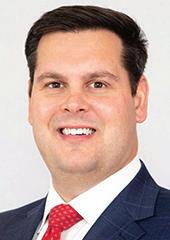
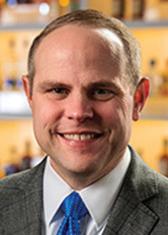
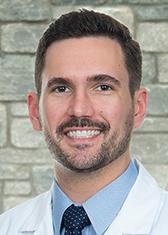

Cameron Freeman has joined Truist as the market president of Lexington and Eastern Kentucky.
Les Fugate, vice president and director of public affairs for the U.S. State and Local, Canada, and Latin America for Brown-Forman Corporation, has been elected as the 2026 chair of the Kentucky Chamber of Commerce Foundation.
Frontier Nursing University announced that Laura Manns-James, PhD, CNM, WHNP-BC, CNE, FACNM, has been named the Interim Department Chair of Women’s Health.
NAI Isaac has welcomed new property manager Michael Neal to its Lexington office.
Barry E. Frazier has been named the Mt. Sterling market president of Community Trust Bank, Inc.

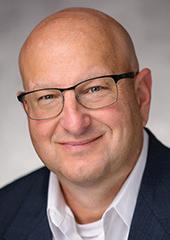
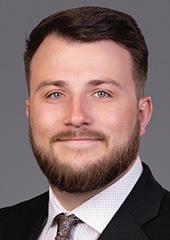

Castle & Key Distillery announced the appointment of Sherrie Moore as plant manager.
Lexington Mayor Linda Gorton has named University of Kentucky administrator Lisa Higgins-Hord as new councilmember for Lexington’s 6th District. It is the second time Gorton has named Higgins-Hord to the Council.
Ellen Williams was recently promoted to external affairs lead for Kentucky American Water.
Lexington Clinic announced the additions of ophthalmologist Andrew Fink and internal medicine physician Chase Thornton.
Anthony Doherty joins Traditional Bank in the role of community lender.
CHI Saint Joseph Health has welcomed Sarah Bissmeyer, MD, to Saint Joseph Medical Group – Primary Care. Thomas Troy, MD, has
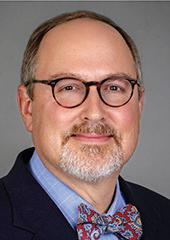



joined Saint Joseph Medical Group – Family Medicine; Elise Garrett, MD, has joined Saint Joseph Medical Group –OBGYN; Erin Martin, PA-C, and Armaghan Soomro, MD, FACC, FSCAI, RPVI, have joined Saint Joseph Medical Group – Cardiology; and Darcy Taddeo, MPAS, PAC, has joined Saint Joseph Medical Group – Neurology. Oncology nurse Kelly Napier has joined Saint Joseph Health – Cancer Care Center; and Saint Joseph Health – Sleep Care Center in Lexington has welcomed Donna Crockett, MSN, APRN, NP-C, to its team.
R. J. Corman Railroad Group has named Alín Campián as its new executive vice president and chief financial officer.
The University of Kentucky Martin-Gatton College of Agriculture, Food and Environment has named Jennifer Hunter as associate dean for extension and director of the Kentucky Cooperative Extension Service.
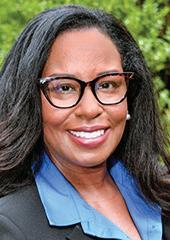
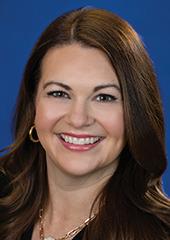

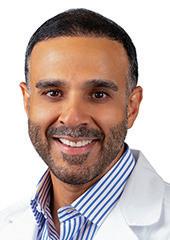
Hannah Jackson has joined Commerce Lexington’s economic development department as administrative project coordinator.
Fifth Third has promoted Mary-Alicha Weldon to lead its Commercial Banking Division across Kentucky and Southern Indiana.
Keeneland has appointed Anne Archer Hinkle to its advisory board of directors.
Sherman Carter Barnhart Architects has named Justin McElfresh, AIA, president of the firm, and announced that Mike Smith will continue in his role as CEO.
The Lexington Ballet Company announced the appointment of Kevin Jenkins as interim artistic director.
Marcus Miller has joined Bank of the Bluegrass & Trust Co. bank as vice president, commercial lender.







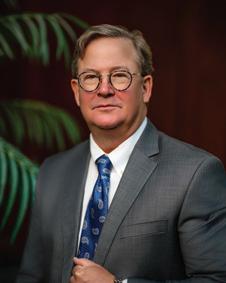
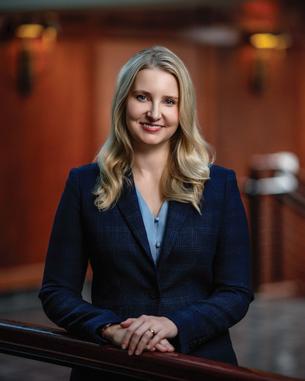
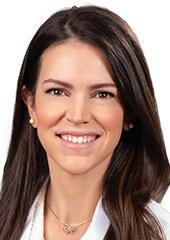
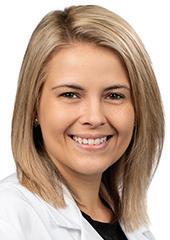
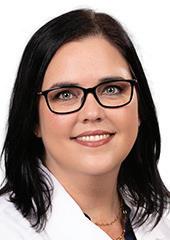
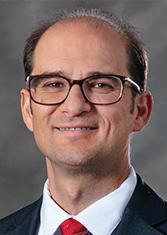
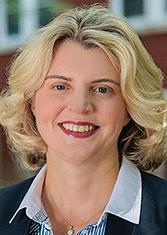
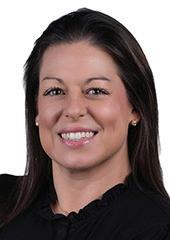
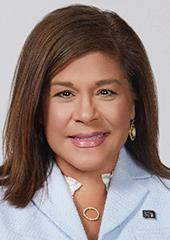


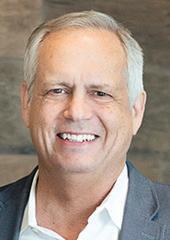

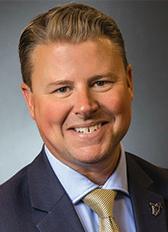
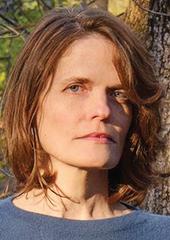

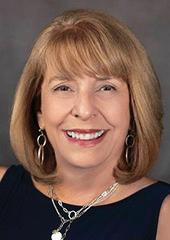
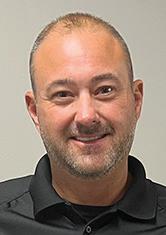
The Sewanee Review has presented Rebecca Gayle Howell with the 2025 Aiken Taylor Award for Modern American Poetry.
Chevy Chase Animal Clinic veterinarian Eric Headley recently announced his retirement after 25 years of service to Lexington-area pet-owners.
Practitioner and educator Susan Stone, DNSc, CNM, FACNM, FAAN, was inducted into the first class of the Frontier Nursing University Alumni Hall of Fame.
Baptist Health Lexington advanced emergency medical technician, Paul Gray, has been presented the BEE (Being Exceptional Everyday) Award recognizing extraordinary team members who provide outstanding care and service.
Saint Joseph Hospital and Saint Joseph East are the
first hospitals in Lexington to offer minimally invasive surgery performed with stateof-the-art da Vinci 5 Surgical Robots.
Thomas More University and Kentucky Community and Technical College System recently launched Pathways to More, a groundbreaking dual-admission and transfer program that ensures students across the Commonwealth have a seamless and accessible path to complete both an associate and a bachelor’s degree.
Lexington-based CannaBuzz has become the first THC beverage supplier accepted as an associate member of the Wine & Spirits Wholesalers of America. The membership marks a Kentucky milestone and reflects the growing presence of cannabis-infused, nonalcoholic beverages in mainstream, age-restricted retail.
Baptist Health Lexington has ranked in the Top 100 for consumer loyalty nationwide
and has earned a 2025 Consumer Loyalty Award from patient experience firm National Research Corporation Health. The hospital also once again achieved recognition as a Comprehensive Stroke Center by the Joint Commission, marking its fifth consecutive designation from the nation’s leading healthcare accrediting body. In further news, Baptist Health Lexington has received the American College of Cardiology’s NCDR Chest Pain-MI Registry Platinum Performance Achievement Award for 2025. It’s one of only 323 hospitals nationwide to receive the honor.
The International Economic Development Council (IEDC) has honored Lexington-Fayette Urban County Government and Commerce Lexington with multiple 2025 Excellence in Economic Development Awards, recognizing the community’s leadership and collaborative approach in advancing growth and opportunity. The Greater LEX Regional Competitiveness Plan was named a gold winner
in the Regional or CrossBorder Partnership category. The Look At Lex talent website was named a silver winner in the Special Purpose Website category. The Lexington Second Chance Academy Workforce Reentry Program was named a bronze winner in the Talent Development & Retention category.
On the heels of receiving the Raymond James Community Bankers Cup for its 2024 performance, Republic Bancorp, Inc., has been ranked among Bank Director’s top 25 publicly traded banks.
The Trademark Lawyer Magazine has named Stites & Harbison, PLLC to the 2025 Top 10 Trademark Firms and IP Practices in North America – South list. This is the firm’s third year being honored.
Frontier Nursing University has established an Office of Student Engagement, Access, and Success. The initiative will ensure comprehensive support from enrollment to graduation and beyond. n
Business Lexington is as local as it gets — written by, for and about businesses large and small throughout Central Kentucky. Constructive in approach, Business Lexington illuminates the experiences, challenges and successes of the business professionals of Fayette, Franklin, Scott, Madison, Mercer, Woodford, Clark, Jessamine, Bourbon, and Montgomery Counties. Readers find a roster of writers from the community, covering topics ranging from economic development, real estate, entrepreneurship, marketing and sales to agri-tourism, arts and the economy, the Internet and business related political and legislative activity in Frankfort and Washington, D.C. Published monthly, Business Lexington is devoted to serving the interests of one of the nation’s fastest growing medium-markets, keeping its readers updated and informed with a variety of content and maintaining an open dialogue on current issues to encourage a vibrant and active local business community.
“Business Lexington does a great job highlighting the impact of businesses in the Lexington area, including many of our Kentucky Chamber members. Their partnership helps our organization broaden our reach and elevate the conversations that matter to Kentucky’s business community. Their continued support plays an important role in our work to build a stronger, more vibrant economy, and we look forward to continuing this meaningful partnership for years to come.”
– Kentucky Chamber President and CEO Ashli Watts
Investing in print advertising results in:
• Higher comprehension and more focused attention
• Print business publications reach affluent influential customers because they are trusted.
• Brands that advertise in print magazines achieve greater increases in brand awareness, favorability, and purchase intent!
Over 25,000 business leaders subscribe to Business Lexington‘s “Weekly Wire” email newsletter. Market your company directly to them.
FOR ADVERTISING INFORMATION
EMAIL ADVERTISE@SMILEYPETE.COM OR PHONE 859.266.6537
SUBSCRIBE TO BUSINESS LEXINGTON
January
Banking & Wealth Management
BizLists: Wealth Management Firms, Accounting Firms, Advertising & Creative Agencies
February
Real Estate & Lending
BizLists: Real Estate Law Firms, Mortgage Lenders, Architecture Firms
March 2026 Book of Lists
April
Business of Law
BizLists: Law Firms, Insurance Agencies, Major Regional Employers
May
Banking & Investment
BizLists: Banks, Credit Unions, Employment Law Firms
June
Wealth Planning Strategies
BizLists: Residential Real Estate Firms, Commercial Construction Firms, Property Management Companies
July
Economic Development
BizLists: Audio/Visual Companies, Engineering Firms, Staffing Companies
August
The Future of Business
BizLists: Manufacturing Employers, Information Technology Firms, Intellectual Property Law Firms
September
Finance & Law
BizLists: Commercial Lenders, SBA Lenders, Family Law Firms
October
Annual Regional Market Review of Central Kentucky
BizLists: Chambers of Commerce
November
Healthcare & Law
BizLists: Hospitals, Healthcare Law Firms, Concierge Medical Practices
December
Education & Continued Training
BizLists: Colleges & Universities, MBA Programs, Private Schools





John Gardner President, Bank of America Kentucky
